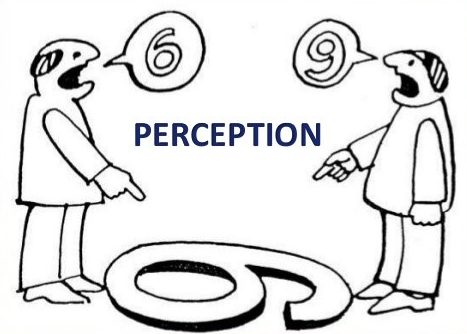Since Covid-19 early in 2020, I’ve been working with a number of athletes, from junior-elites to collegians to Olympians and pros. Though the pandemic has been a truly awful experience, it has also given many athletes the opportunity to focus on aspects of their sports lives that they had been neglecting, including mental training.
Of course, I’ve introduced these athletes to the immense value of traditional mental training tools such as self-talk, imagery, and routines. At the same time, a real emphasis in my work this summer and fall has been on “deeper” mental stuff that I believe may be more impactful on whether athletes perform their best or not. What underappreciated, yet oh-so-powerful mental tool am I referring to? Perceptions!
You might have been expecting some sort of “OMG!” moment when I revealed this secret mental tool, so sorry to disappoint. Yet, in this article, I hope to convince you of how superpowered perceptions are in athletic performance and, in fact, life in general. What is also important is whether you use these superpowers for good or for evil. Clearly, when you go to the “dark side” of perceptions (apologies for the Star Wars reference), nothing good comes of it. Conversely, when you use your perceptions for good, truly remarkable things can happen such as consistently training and competitive performance, and even great results.
What are Perceptions?
I believe that it’s important that we have a shared understanding when I introduce powerful words even when words, such as perception, may seem obvious. Perception is defined as “a way of regarding, understanding, or interpreting a situation.” Now you start to see why perceptions are so important in sports performance. Basically, they act as the lens through which you look at and respond in your athletic efforts. Perceptions are so powerful because they impact how you think about your sport, the emotions you experience in your sport, and, ultimately, how you perform in your sport.
A challenge with perceptions is that they can be either weapons that hurt your athletic efforts or tools that support those efforts. Perceptions that are weapons can include looking at your athletic performances negatively and critically, seeing them anxiety provoking, or having those perceptions become distracting and self-defeating, all of which will surely set you up for failure.
In contrast, perceptions that are tools are those that are positive, motivating, calming or energizing (depends on what works for you), and focusing. These helpful perceptions create a mental and physical state that will support outstanding effort in training and exceptional performance in competitions.
Though I have argued elsewhere that “perception is not reality,” what you perceive about your athletic performances becomes your reality. For example, two athletes can arrive at a competition in, say, Florida where it is hot and humid. One is from the Northeast where it is never is that warm. Her initial perceptions include “How can I play well when it’s so hot?” and “I don’t have a chance today.” Clearly, not perceptions associated with a successful day. In turn, another athlete who grew up in Florida, as a result, has practiced and competed in this sort of weather with considerable frequency has these perceptions: “It sure is hot today, but this is nothing new to me” and “Hey, my opponent has to deal with this heat to, so I’m just going to do what I always do, which is give it everything I’ve got!” In this case, her perceptions give her an opportunity to play her best and achieving her goals despite the weather.
Conscious vs. Unconscious Perceptions
A complication with perceptions is that they can be either conscious (you’re aware of them) or unconscious (you have no awareness of them). Conscious perceptions are relatively easy to deal with because you know what they are and, as a result, can make a deliberate effort to change them if you decide that those perceptions aren’t helping you. For example, before a competition, you might think “OMG, the other team is really good!” This negative perception will likely lead to anxiety and tentative performances. Recognizing this, you can choose to shift your perceptions in a more positive direction, such as “The other team is good, and I can’t wait to show them good we are.” Certainly, a vastly different perception that will likely result in committed and aggressive play.
It’s the unconscious perceptions that are the real problems when it comes to how you look at your athletic performance. Because these perceptions are unconscious, you’re not, by definition, aware of them. Yet, they can still have an enormous impact on how you think about, feel toward, and perform in your sports efforts.
Unconscious negative perceptions don’t just arise for no reason or without cause. Rather, they are symptoms of unconscious “baggage” that have developed earlier in your life. Some of the types of baggage I find with the athletes with whom I work include:
Examples of how this baggage develops include becoming a perfectionist to satisfy a demanding father or developing a fear of failure because failure was punished by your parents. All these forms of baggage arise in childhood, again unconsciously, and exert a significant influence on the negative perceptions that you hold about your sport despite their being outside your conscious awareness.
A question you may then ask is: “How do I know I have these perceptions buried deep in my psyche if I don’t know they exist?” Well, there are some red flags that can alert you to whether you have perceptions that are interfering with your athletic efforts.
Your emotions are perhaps the most powerful warning signs of unconscious negative perceptions. If you are feeling any unpleasant emotions related to your sports participation, the chances are they are being fueled by unconscious negative perceptions. For example, fear, frustration, anger, sadness, or disappointment that are out of proportion to the sports situation you are in typically all driven by the causes I described in the bulleted list above. When you experience these emotions frequently in your athletic life, if you “look under the hood” of your psyche, you will likely find one, some, or the entire list.
What you feel physically is another very noticeable red flag for unconscious negative perceptions. If you feel anxious, stressed, tense, or physically uncomfortable, the chances are that some unconscious negative perceptions are fueling those physical sensations.
Finally, what you are thinking consciously are also warning signs of unconscious negative perceptions at work. When your thinking is driven by worry, doubt, tentativeness, caution, or apprehension, you can assume that your baggage has been triggered in your unconscious and it is producing some unproductive unconscious perceptions.
Change Your Perceptions, Perform Better
You have two goals related to perceptions. Your first goal in practice and on the day of a competition (and, in fact, every day!) is to ensure that your unconscious negative perceptions don’t control your thinking, emotions, and sports efforts. Your second goal is to make deliberate choices about what perceptions you want to have in practice and on game day (and, again, every day) that will help you to think positively, feel good emotionally and physically, and perform your best.
Be mindful. Start by being aware of the perceptions you have as you approach practice or a game day and, on the day of the competition, as you head toward the field of play and then when the competition begins. This involves a degree of mindfulness in which you stop briefly and ask yourself what you are thinking and feeling about the upcoming event. You can make note of your conscious perceptions (thoughts about the competition you are aware of). You can also check your emotions and do a scan of your body for physical sensations that can provide insight into what unconscious perceptions might be impacting your thoughts and feelings about performing that day.
Identify negative perceptions. Be specific in identifying whatever negative perceptions may be influencing your psyche. Whether your perceptions are conscious or unconscious, bring them to the front of your mind. This clarity will make them more tangible and give you a greater sense of control over them. You can also evaluate how reasonable they are.
Understand where your perceptions came from. If your perceptions are conscious, you can ask yourself what is causing them, for example, how prepared you feel, weather, field conditions, the importance of the competition, how good your opponents are, or non-sport issues such as school or family. If they are unconscious and you intuited what they might be from your emotions or physical state, explore what baggage may be producing them.
Accept, then challenge, your negative perceptions. If you do realize that you’re approaching your practice or game day with negative perceptions (whether conscious or unconscious), there is a natural tendency to try hard to resist them: “Stop thinking so negatively!” or “You need to be psyched to here!” This approach to changing your negative perceptions is like trying to push an elephant out of a room; not going to happen! Instead of pushing against that elephant that is your perceptions, accept that you have those perceptions (realize that even the world’s best athletes experience negative perceptions), acknowledge that they aren’t going to help you in your competition that day, and then challenge those perceptions (tell yourself why they aren’t true).
Create conscious positive perceptions. Finally, identify some perceptions that will support your efforts on game day (e.g., “I’m just going give it my all regardless of the conditions!” or “I’m really prepared to play my best today!”). Instead of feeling stuck on a bad road in which you are propelled by your negative perceptions, you’ve created a fork in the road and now have the conscious positive perceptions at the front of your mind leading down a good road. The destination where your conscious positive perceptions are leading you is a day full of fun, strong effort, and the great feeling of knowing that you were your best ally and you left it all out there.
Want to make mental training a part of your program’s early-season prep plan? Here are a few options:
- Athletic performance blogs.
- Train Your Mind for Athletic Success.
- online mental training courses for athletes, coaches, or parents.
- 1:1.







